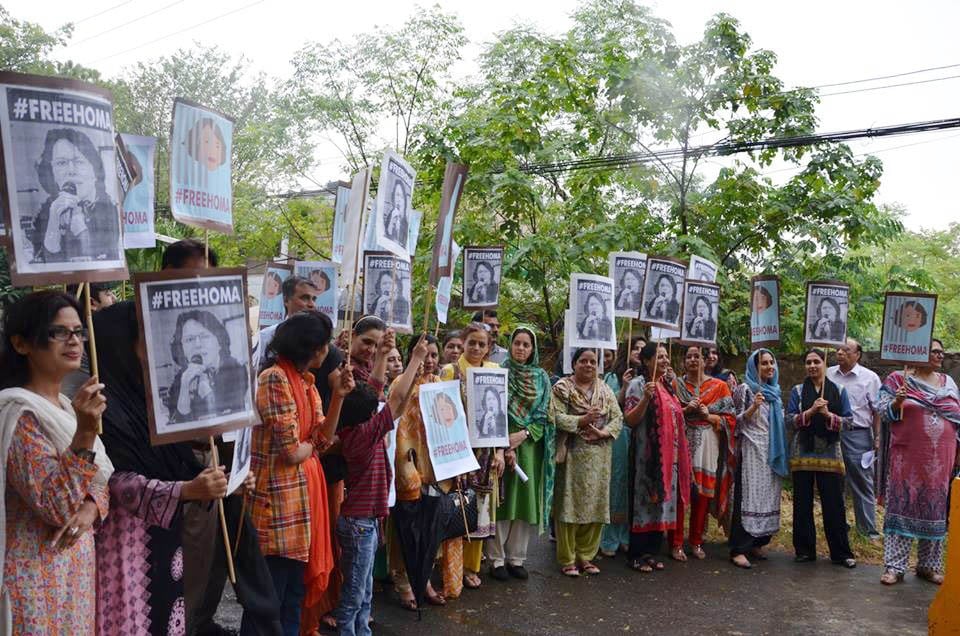
Dr Homa Hoodfar’s detention in Iran on unknown charges shows there is still a long way to go with respect to improving the state of human rights in the country

It has been over two weeks since academic Dr Homa Hoodfar’s detention in Evin Prison in Tehran. This comes after three months of interrogation starting in March, during which her apartment was raided and her passports and electronic devices were seized. Though there is still no official confirmation with respect to the charges against her, her niece, Amanda Ghahremani, has said that according to the news leaked on the country’s conservative media associated with the Revolutionary Guards, she is being accused of "fomenting a soft feminist revolution" in the country.
It is important to note that all of this is happening after the historic nuclear deal with Iran which resulted in the lifting of economic sanctions that had made the country an international pariah. The Rouhani administration was dubbed moderate in comparison to the previous one and was praised for bringing Iran back in the game after years of isolation. However, it appears that there is still a long way to go with respect to improving the state of human rights in the country.
Dr Hoodfar, a Canadian-Iranian professor of social anthropology, still has not been allowed to meet family or seek legal counsel. In addition to this, she has not been provided medical aid despite the fact that she suffers from a rare neurological problem.
Iran does not recognise dual nationality either and that makes the situation more complex. Despite carrying three passports -- Canadian, Irish and Iranian -- Dr Hoodfar is still considered to be just Iranian. It is also distressing to note that this is what being an Iranian citizen means - being denied legal and medical counsel, not being allowed to meet one’s family and the reasons for one’s arrest being kept secret.
Other dual nationals arrested recently include American-Iranian businessman Siamak Namazi, who was also jailed in October without any explanation when he was visiting family in Iran. Baquer Namazi, his 80-year-old father and a former Unicef official, has also been jailed and not given access to lawyers. Nazak Afshar, a French-Iranian and a former employee of the French embassy in Tehran, was sentenced to six years in jail in April under similar circumstances.
"What is extremely worrying is not having access to a lawyer, not knowing presumably what the charges are, not getting medical attention and not being able to meet family. That defies all human rights’ norms. Forget international law, that defies humanity itself and the principles of justice," says feminist academic and founder of Women’s Action Forum (WAF), Nighat Said Khan and a college friend of Dr Hoodfar. Together with Neelam Hussain and Rubina Saigol, conveners of the organisation, she has written a letter addressing the Iranian President, the ambassador of Iran to Pakistan and the Iranian Supreme Leader expressing shock at Dr Hoodfar’s arrest, asserting that she is an anthropologist and not a political activist and requesting that she be given legal and medical counsel, access to family and that her passports and essential documents be returned to her so that she can travel freely and resume her academic work.
"This is so peculiar because at this time when Iran is trying to open up and project a very different image of the country that something like this would happen to a person who would have an international campaign around it," she comments.
The WAF also staged a protest in front of the Consulate General of the Islamic republic of Iran in Lahore on June 21, 2016. The letter was faxed to the embassy in Islamabad by the staff at the consulate and Khan expressed her optimism with respect to the openness displayed by the staff which she says is encouraging.
"We don’t know whether it [the arrest] is being ordered from the top. There’s a whole section in Iranian society that does not like the fact that Iran has opened up. Just like we in Pakistan have our right wing that does not like it when our relationship with India or the US improves. Such developments need to be seen in the larger context," says Khan.
"Iran has been trying to get rid of its old image and replace it with a new, more progressive one. If it is to do that, then it must follow global standards of human rights," agrees human rights activist and director of Program of Women’s Empowerment & Leadership Development, Shirkat Gah, Gulnar Tabassum
"At least, let us know whether or not she [Dr Hoodfar] is being given medical attention and allowed to meet her family," she adds.
When Dr Hoodfar spoke to TNS last year (interview published on December 6, 2015) during her visit to Pakistan to attend an international conference of Women’s Empowerment and Leadership Development for Democratisation (WELDD) programme organised by Shirkat Gah, she took a balanced approach and even while addressing questions related to the practice of veiling, she underlined the need to understand the complexities of an ancient tradition instead of dismissing it right away.
She demonstrated a sense of pride about her Iranian roots and spoke out against the west’s depiction of Iran in the media dubbing the black chador that women are seen wearing on tv as misleading, adding that vibrant colours do not make the news. Sharing a personal anecdote, she expressed her surprise when she discovered during her research in Egypt that women did not go to mosques there. "I had no idea that, as a woman, you had no space in the mosque because in Iran women always had the mosque," she told TNS.